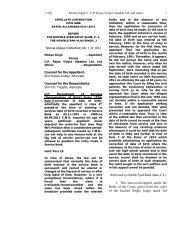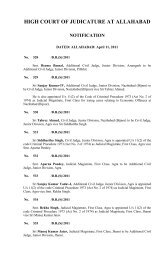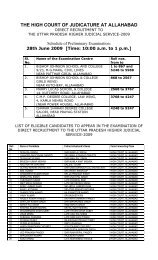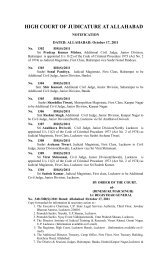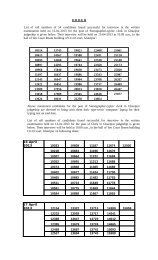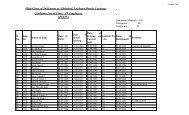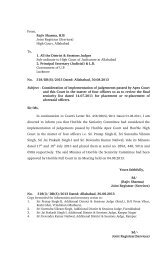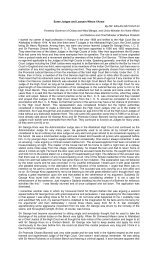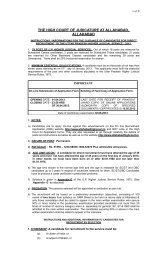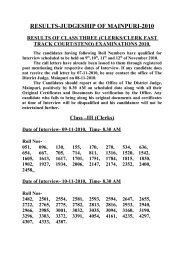May - High Court of Judicature at Allahabad
May - High Court of Judicature at Allahabad
May - High Court of Judicature at Allahabad
You also want an ePaper? Increase the reach of your titles
YUMPU automatically turns print PDFs into web optimized ePapers that Google loves.
2All] Ishwar Chand V. A.D.M.(Civil Supply), R.C.&E.O., Kanpur Nagar and another 47<br />
same premises in the year 1986. The<br />
petitioner, as grandson <strong>of</strong> Ram Sahodar, is<br />
residing in the disputed accommod<strong>at</strong>ion. His<br />
grandf<strong>at</strong>her, Ram Sahodar, also executed a<br />
Will in his favour on 3.10.1989 whereby he<br />
beque<strong>at</strong>hed all his rights and title in all his<br />
properties. It was further st<strong>at</strong>ed th<strong>at</strong> as the<br />
land lords <strong>of</strong> the house namely Khem Chand<br />
and Gyan Chand had entered into an<br />
agreement to sell the disputed premises on<br />
20.2.1987 and also handed over possession in<br />
pursuance <strong>of</strong> the agreement, his possession<br />
cannot be tre<strong>at</strong>ed as unauthorised. The Rent<br />
Control and Eviction Officer, considering the<br />
objection, declared it as vacant. This order has<br />
been challenged in the present writ petition.<br />
4. Learned counsel for the petitioner<br />
contended th<strong>at</strong> Ram Sahodar had executed a<br />
Will in favour <strong>of</strong>; the petitioner on 20 th<br />
February 1987and he is entitled to inherit the<br />
tenancy rights on ;the basis <strong>of</strong> the Will. It is<br />
settled law th<strong>at</strong> tenancy rights cannot be<br />
transferred by a Will in favour <strong>of</strong> any person<br />
vide R<strong>at</strong>an Lal v. Additional District Judge,<br />
Bulandshahr and others, 1979 ARC 251,<br />
Devendra Kumar v. III Additional District<br />
Judge and others, 1980 ARC 519 and<br />
Abhinandan Prasad Jain v. District Judge,<br />
Saharanpur and others, 1982 (1) ARC 708.<br />
5. The next submission <strong>of</strong> the learned<br />
counsel for the petitioner is th<strong>at</strong> <strong>at</strong> the time <strong>of</strong><br />
de<strong>at</strong>h <strong>of</strong> the grandf<strong>at</strong>her <strong>of</strong> the petitioner, he<br />
was residing in the disputed premises with<br />
him and as such he inherited the tenancy<br />
rights. It is admitted to the petitioner th<strong>at</strong> his<br />
f<strong>at</strong>her Prem Das is alive, who purchased<br />
another premises in the year 1986 and<br />
admittedly he had shifted there. He is not<br />
claiming th<strong>at</strong> he has inherited the tenancy and<br />
is continuing in possession <strong>of</strong> the disputed<br />
premises. The petitioner cannot inherit the<br />
tenancy in preference to his f<strong>at</strong>her who is still<br />
alive. Section 3-A defines the tenant as<br />
follows:-<br />
“3)a) “tenant”, in rel<strong>at</strong>ion to a building,<br />
means a person by whom its rent is payable,<br />
and on the tenant’s de<strong>at</strong>h—<br />
(1) in the case <strong>of</strong> a residential building,<br />
such only <strong>of</strong> his heirs as normally resided<br />
with him in ;the building <strong>at</strong> the time <strong>of</strong> his<br />
de<strong>at</strong>h,<br />
(2) in the case <strong>of</strong> non-residential building,<br />
his heirs.<br />
6. The contention <strong>of</strong> the learned counsel<br />
for the petitioner is th<strong>at</strong> after the de<strong>at</strong>h <strong>of</strong> the<br />
tenant any <strong>of</strong> his heirs who normally resided<br />
with him <strong>at</strong> the time <strong>of</strong> his de<strong>at</strong>h is entitled to<br />
inherit the tenancy was not normally residing<br />
with the tenant <strong>at</strong> the time <strong>of</strong> his de<strong>at</strong>h, such<br />
other person who comes in the c<strong>at</strong>egory <strong>of</strong> an<br />
heir under the law is entitled to inherit the<br />
tenancy if he was residing with the tenant <strong>at</strong><br />
the time <strong>of</strong> his de<strong>at</strong>h. The personal law will<br />
determine as to who is the person under the<br />
law to inherit the tenancy. Section 8 <strong>of</strong> the<br />
Hindu Succession Act, 1956 provides th<strong>at</strong> the<br />
property <strong>of</strong> a male Hindu dying intest<strong>at</strong>e shall<br />
devolve according to the provisions<br />
mentioned under the Act--<br />
(a) firstly, upon the heirs, being the rel<strong>at</strong>ives<br />
specified in Class I <strong>of</strong> the Schedule,<br />
(b) secondly, if there is no heir <strong>of</strong> Class I,<br />
upon the heirs, being the rel<strong>at</strong>ives specified in<br />
Class II <strong>of</strong> the Schedule,<br />
(c) thirdly, if there is no heir <strong>of</strong> any <strong>of</strong> the two<br />
classes, then upon the agn<strong>at</strong>es <strong>of</strong> the<br />
deceased, and<br />
(d) lastly, if there is no agn<strong>at</strong>e, then upon the<br />
cogn<strong>at</strong>es <strong>of</strong> the deceased.<br />
7. Section 9 <strong>of</strong> the Act provides th<strong>at</strong><br />
among the heirs specified in the Schedule,<br />
those in class I shall take simultaneously and<br />
to the exclusion <strong>of</strong> all other heirs, those in the<br />
first entry in class II shall be preferred to




